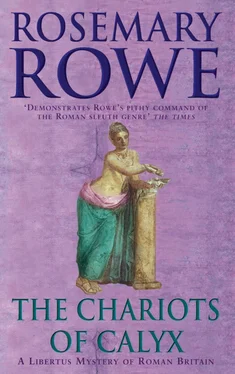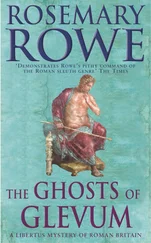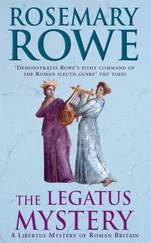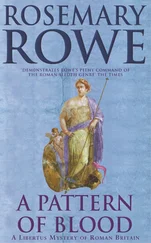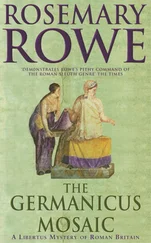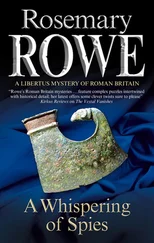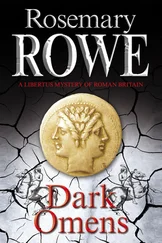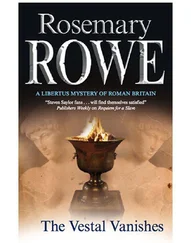Rosemary Rowe - The Chariots of Calyx
Здесь есть возможность читать онлайн «Rosemary Rowe - The Chariots of Calyx» весь текст электронной книги совершенно бесплатно (целиком полную версию без сокращений). В некоторых случаях можно слушать аудио, скачать через торрент в формате fb2 и присутствует краткое содержание. Год выпуска: 2002, ISBN: 2002, Издательство: Headline, Жанр: Исторический детектив, на английском языке. Описание произведения, (предисловие) а так же отзывы посетителей доступны на портале библиотеки ЛибКат.
- Название:The Chariots of Calyx
- Автор:
- Издательство:Headline
- Жанр:
- Год:2002
- ISBN:9781472205087
- Рейтинг книги:5 / 5. Голосов: 1
-
Избранное:Добавить в избранное
- Отзывы:
-
Ваша оценка:
- 100
- 1
- 2
- 3
- 4
- 5
The Chariots of Calyx: краткое содержание, описание и аннотация
Предлагаем к чтению аннотацию, описание, краткое содержание или предисловие (зависит от того, что написал сам автор книги «The Chariots of Calyx»). Если вы не нашли необходимую информацию о книге — напишите в комментариях, мы постараемся отыскать её.
The Chariots of Calyx — читать онлайн бесплатно полную книгу (весь текст) целиком
Ниже представлен текст книги, разбитый по страницам. Система сохранения места последней прочитанной страницы, позволяет с удобством читать онлайн бесплатно книгу «The Chariots of Calyx», без необходимости каждый раз заново искать на чём Вы остановились. Поставьте закладку, и сможете в любой момент перейти на страницу, на которой закончили чтение.
Интервал:
Закладка:
I nodded. ‘I had heard that.’
The warehouse manager pressed his fingers together again. ‘They have proved their worth, this year alone. Some of the harvests in the east would have been wholly spoiled by the rains. And once the corn is dried, of course, it keeps much better too. Then, even out of season, people can come here and buy from us. With the kilns we have grain all year round. Much more efficient than it used to be. But still half the cost is transport, as I expect you know.’
I was thinking about that five thousand denarii . ‘Do farmers transport the goods at their own cost?’
For the first time, he smiled. A thin little ghost of a smile, as if the idea pleased him. ‘It all depends. Some of this grain is tax corn, collected by the government — that’s used for the army, in general. Then on some large estates we have an outright option on the whole crop every year, and of course the procurator owns many farms himself, and in those cases, obviously, there is no charge for transport and drying. If it is a smaller man with just a field or two, then he will bring the corn here at his own expense, and pay to put it in the drying kilns.’
‘Or apply for a compulsory loan to build his own?’
‘As you say, citizen.’
‘It is a wonder he chooses to sell his corn at all,’ I said.
He smiled again. ‘But of course, citizen, he has to pay his land taxes. In coin. So he is forced to bring his goods to market to earn the money.’
‘Very well,’ I said, impressed by the ruthlessness of his logic. ‘So the grain arrives here. What happens to it then?’
He led the way, up and down ladders and in and out of rooms heavy with grain dust, showing us how the grain was barrowed into large storage areas, and raked constantly to keep it dry and turned.
‘Here you are, you see, citizen,’ he said proudly, as we reached a central court. ‘This is the loading area.’ A number of wooden channels, with hatches, stood around the walls, and at one of them two slaves were holding a wide-mouthed bag. The shutter opened and a waterfall of golden grain streamed down the chute and into the sack. One of them shouted something, there was a sound of hand-wheels turning and the shutter closed again, cutting off the stream of corn just as the top of the bag was reached. The two slaves dragged the sack away, another began sewing up the top with a bronze needle, and the whole operation began again. An overseer with an abacus was counting off the sacks as they were completed.
‘About five mobius -fuls to fill a sack that size,’ our guide announced, indicating one of the corn measures hanging on the wall. ‘Worth about twenty denarii at this time of year, though the price seems to be going up all the time. That’s good news for us, of course. Some people want less than a sackful, and others more. We sell to bakers, market traders, large city households — and to the army, too, of course. It is shipped out again by river, or loaded on to waggons at the back. We are just inside the town defences here, but we have our own entrance through the eastern wall.’
‘This is important business then?’ I said, impressed by the idea of a private gate.
He preened. ‘One of the most important in the city. Some of our grain is even exported to Rome. Now, I don’t think there is anything else I can show you, gentlemen?’
I bent down to pick up a few seeds of scattered grain. They were different in size and shape, and one of them was spongy to the touch. ‘Why are there several different chutes?’ I asked, looking at the wooden channel through which the corn was pouring again.
‘Each grain comes down from a different storage area,’ he explained. ‘This one is spelt and rye, that one is barley, and so on. Spelt is the easiest to store — it has to be roasted before it can be threshed, and so it never rots. Of course that’s less of a problem now, thanks to Monnius’ drying floors.’
He led the way outside, and waved a hand. ‘Oh, and Monnius recently began a scheme to deal in hay — there is quite a market for it as winter fodder for horses. That is stored in the warehouse over there. It has been a good investment — we are quite close to one of the racing stables here, and they are pleased to have it, as well as their usual grain. We have even sold hay back once or twice to some of the farmers we bought it from. At a profit, of course.’ He gave me that thin smile again. ‘That is all, citizen, unless you wish to see my office? It is through this door, although there is nothing to see.’
There might, of course, have been much to learn if I’d had time to examine in detail all the documents stacked, or stored in pots, around the walls. Invoices, lists, records, orders — scribbled on bark, scratched on wax or inscribed with elaborate care on vellum scrolls — the office was a mass of documents. There was another abacus, and a steelyard, too, with a series of little weights beside it.
‘For corn?’ I asked, surprised. The weigh pans looked too small.
He gave me a pitying glance. ‘For weighing money, citizen. In a city this size there are always lots of strange coins in circulation. Egyptian, Greek — all sorts of things. People even take shavings off imperial coins and melt them down. I always have my banker weigh the coins we receive to make sure they contain the right quantity of silver. Or of gold, of course. Sometimes the sums involved are very large.’
As much as five thousand denarii , I wondered. That decided me. I asked the question that had been on my lips all morning. ‘Do you ever have dealings with a man called Eppaticus?’
He did not start, or blush, or falter. Instead he became unnaturally still. The only movement was in the narrow fingers, pressing on each other harder than ever. At last he said, ‘I believe I have heard the name, citizen. Though I myself have never had the pleasure. . I will glance through my records for you, if you wish.’
‘If you would be so kind,’ I said, but knew that it was useless. There were so many records in that office, a man could search there for a year and find nothing — especially if it was something he did not want to find. But there was nothing else to be gained here, and there were several other warehouses. I allowed myself to be guided back towards the barge, where my boatman was waiting for me. The smaller boat had loaded up and gone, I noticed, and the larger one was almost ready to leave as well. I would have to hurry if we were to clear the quay without hindering commerce.
The warehouse official watched me teeter up the plank and take my place on the seat, his face wreathed in smiles now. ‘Farewell, citizen. I hope we have been of service. And now, if you will excuse me, I have a customer.’ He hurried off in the direction of a tall man in a long cloak who had just strolled on to the quay, and a moment later they were walking off together, deep in conversation.
As we pulled away from the quay I glanced at the cloaked figure, and in the same instant he glanced back at me. We both reacted together. He turned abruptly and began to walk away. Boat or no boat, I jumped to my feet.
‘Back!’ I shouted to the bargemaster. ‘Take me back there at once!’
He raised a shaggy eyebrow, but he barked out the order. The oarsmen backed their oars, and slowly — infinitely slowly it seemed to me — the boat slowed, then turned about on itself and began to inch back towards the shore. The bargemaster looked at me quizzically. ‘You know that fellow, citizen?’
‘I don’t know him exactly. I have never spoken to him, but I have seen him before. I wonder what he is doing here so soon. He must have made great efforts to get here.’
I glanced at Junio. He was gazing at the shore with a kind of rapt excitement. ‘It is him, isn’t it, master?’
Читать дальшеИнтервал:
Закладка:
Похожие книги на «The Chariots of Calyx»
Представляем Вашему вниманию похожие книги на «The Chariots of Calyx» списком для выбора. Мы отобрали схожую по названию и смыслу литературу в надежде предоставить читателям больше вариантов отыскать новые, интересные, ещё непрочитанные произведения.
Обсуждение, отзывы о книге «The Chariots of Calyx» и просто собственные мнения читателей. Оставьте ваши комментарии, напишите, что Вы думаете о произведении, его смысле или главных героях. Укажите что конкретно понравилось, а что нет, и почему Вы так считаете.
